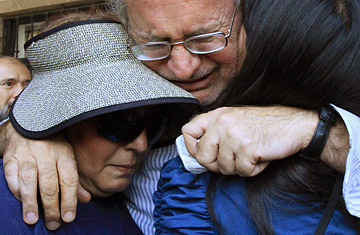
Javier Sicilia cries while hugging family members in Cuernavaca, Mexico, on April 1, 2011
The image of seven corpses of young men and women who had been tortured, murdered and dumped in a car was depressingly familiar in drug-war-torn Mexico. But unlike the thousands of other killings, one victim of last week's multiple homicide in the spa town of Cuernavaca had a well-known father, and that man's grief gained national attention.
The journalist and poet Javier Sicilia led a march to commemorate the death of his son and his son's friends, who all appear to be innocent victims caught up in the violence. In the media spotlight, Sicilia said what has been on the mind of many weeping parents. The war on drugs is not working, he said, and the government has to make a truce with the cartels. "Drug trafficking goes on. The United States doesn't care and is not helping us at all," Sicilia told reporters. "The mafias are here. We should make a pact."
The statement sparked a sizzling public debate, which many Mexicans have been conducting in private for years: Should the government reach out to criminal gangs to calm the bloodshed? President Felipe Calderón, who kicked off a crackdown on the cartels in December 2006, has insisted that he will never negotiate with criminals. But after 35,000 drug-related murders, car bombs and shootouts, much of the public has grown weary of the war. "There has been an important sea change of opinion," says John Mill Ackerman of Mexico's National Autonomous University. "People are no longer buying the story that things have to get worse before they get better." Calderón is banned by the constitution from running in the presidential election next year, and whoever follows him could be open to new ideas on Mexico's crime problem.
How any truce could look in reality is a tough question. In a follow-up news conference, Sicilia explained that by "pact" he meant that gangsters should be urged to avoid hurting the public and respect the prisoners they take. Others suggest that a truce could simply mean a government decision to chase drug traffickers less and give police more time to tackle crimes like kidnapping and extortion, which are rampant. There is also a debate as to whether the government should allow cartels to dominate specific trafficking routes, thus avoiding the bloody turf wars. This notion is so commonly discussed, it has its own terminology: "repartir plazas," roughly meaning "to award turfs."
Most historians of Mexico say the tactic of awarding turfs was employed during the 71-year rule of the Institutional Revolutionary Party (PRI), keeping the country relatively peaceful until the party lost power in 2000. However, PRI leaders deny this, claiming they were simply better at combating crime. Opinion polls show that the PRI is the current favorite to win back the presidency in 2012, as many voters feel that life was safer back in the days of one-party rule. The PRI's record and policy on drug cartels will likely come under much discussion in the runup to the race.
But many are calling for a change in drug-war tactics no matter who wins in 2012. Historian Lorenzo Meyer says a public debate about a pact with cartels is long overdue. "The current policy has created violence and chaos that leaves citizens totally unprotected," Meyer says. "A new government could say that there will be no war on drugs in Mexico if there isn't one in the United States. The U.S. government is not stopping drug use or the flow of weapons or money laundering." American operatives in the drug war have been among the biggest fans of Calderón's offensive. On Tuesday, the U.S. Drug Enforcement Administration's Michele Leonhart praised Calderón for standing firm against cartels while at a conference in Cancún. Leonhart emphasized how Calderón pursues "a war without truce" — an apparent stab at Sicilia's comments.
Nevertheless, this year, American citizens have been increasingly feeling the pinch of the violence. An American missionary was shot dead in Mexico in January, while gunmen slew a U.S. Customs agent in February. And on Monday, assailants shot dead two Americans at a border crossing in Tijuana. Motives are unclear in much of the violence that has swept Mexico, including the murder of the seven in Cuernavaca and the discovery on Wednesday of a mass grave with some 40 bodies in Tamaulipas.
Sicilia's son Francisco was a 24-year-old student with no criminal record. According to reports in local newspapers, Francisco Sicilia went with friends to a bar, where they had a loud conversation about the drug violence. Leaving the bar, one person from the group reportedly called a family member to say they were being followed. Their bodies were later found in a car next to a note that said, "This is what happens to those who make anonymous calls to soldiers." In the fog of the drug war, the clues point in many directions. Sources quoted by the newspaper La Jornada on Tuesday said that rogue soldiers are suspected in the killing.
Sicilia says there are no words to describe the grief of losing a son. "This pain has no name because it is unnatural," Sicilia wrote in an open letter addressed to politicians and criminals. "From this suffering, from this indignation that these deaths have caused, we are f---ing sick of it."
